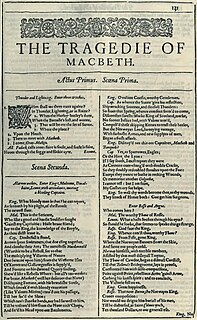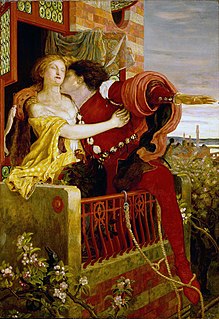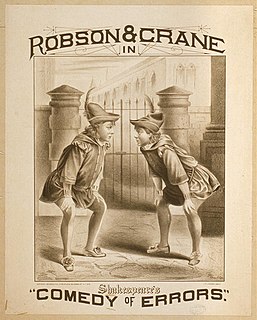Related Research Articles

The Tragedy of Hamlet, Prince of Denmark, often shortened to Hamlet, is a tragedy written by William Shakespeare sometime between 1599 and 1601. It is Shakespeare's longest play, with 29,551 words. Set in Denmark, the play depicts Prince Hamlet and his revenge against his uncle, Claudius, who has murdered Hamlet's father in order to seize his throne and marry Hamlet's mother.

Macbeth is a tragedy by William Shakespeare. It is thought to have been first performed in 1606. It dramatises the damaging physical and psychological effects of political ambition on those who seek power. Of all the plays that Shakespeare wrote during the reign of James I, Macbeth most clearly reflects his relationship with King James, patron of Shakespeare's acting company. It was first published in the Folio of 1623, possibly from a prompt book, and is Shakespeare's shortest tragedy.

Othello is a tragedy written by William Shakespeare, probably in 1603, set in the contemporary Ottoman–Venetian War (1570–1573) fought for the control of the Island of Cyprus, a possession of the Venetian Republic since 1489. The port city of Famagusta finally fell to the Ottomans in 1571 after a protracted siege. The story revolves around two characters, Othello and Iago. Othello is a Moorish military commander who was serving as a general of the Venetian army in defence of Cyprus against invasion by Ottoman Turks. He has recently married Desdemona, a beautiful and wealthy Venetian lady much younger than himself, against the wishes of her father. Iago is Othello's malevolent ensign, who maliciously stokes his master's jealousy until the usually stoic Moor kills his beloved wife in a fit of blind rage. Due to its enduring themes of passion, jealousy, and race, Othello is still topical and popular and is widely performed, with numerous adaptations.

Romeo and Juliet is a tragedy written by William Shakespeare early in his career about two young Italian star-crossed lovers whose deaths ultimately reconcile their feuding families. It was among Shakespeare's most popular plays during his lifetime and, along with Hamlet, is one of his most frequently performed plays. Today, the title characters are regarded as archetypal young lovers.

William Shakespeare was an English playwright, poet and actor. He is widely regarded as the greatest writer in the English language and the world's greatest dramatist. He is often called England's national poet and the "Bard of Avon". His extant works, including collaborations, consist of some 39 plays, 154 sonnets, three long narrative poems, and a few other verses, some of uncertain authorship. His plays have been translated into every major living language and are performed more often than those of any other playwright. He remains arguably the most influential writer in the English language, and his works continue to be studied and reinterpreted.

The Merchant of Venice is a 16th-century play written by William Shakespeare in which a merchant in Venice named Antonio defaults on a large loan provided by a Jewish moneylender, Shylock. It is believed to have been written between 1596 and 1599.

Shakespeare in Love is a 1998 romantic period comedy-drama film directed by John Madden, written by Marc Norman and playwright Tom Stoppard, and produced by Harvey Weinstein. It stars Gwyneth Paltrow, Joseph Fiennes, Geoffrey Rush, Colin Firth, Ben Affleck and Judi Dench.

Simon Phillip Hugh Callow is an English actor, director, and writer. He is internationally known for his roles in films like Amadeus, A Room with a View, Four Weddings and a Funeral and Shakespeare in Love.

Peter Stephen Paul Brook was an English theatre and film director. He worked first in England, from 1945 at the Birmingham Repertory Theatre, from 1947 at the Royal Opera House, and from 1962 for the Royal Shakespeare Company (RSC). With them, he directed the first English-language production in 1964 of Marat/Sade by Peter Weiss, which was transferred to Broadway in 1965 and won the Tony Award for Best Play, and Brook was named Best Director. He also directed films such as an iconic version of Lord of the Flies in 1963.

Stage combat, fight craft or fight choreography is a specialised technique in theatre designed to create the illusion of physical combat without causing harm to the performers. It is employed in live stage plays as well as operatic and ballet productions. With the advent of cinema and television the term has widened to also include the choreography of filmed fighting sequences, as opposed to the earlier live performances on stage. It is closely related to the practice of stunts and is a common field of study for actors. Actors famous for their stage fighting skills frequently have backgrounds in dance, gymnastics or martial arts training.
The History of Cardenio, often referred to as simply Cardenio, is a lost play, known to have been performed by the King's Men, a London theatre company, in 1613. The play is attributed to William Shakespeare and John Fletcher in a Stationers' Register entry of 1653. The content of the play is not known, but it was likely to have been based on an episode in Miguel de Cervantes's Don Quixote involving the character Cardenio, a young man who has been driven mad and lives in the Sierra Morena. Thomas Shelton's translation of the First Part of Don Quixote was published in 1612 and would thus have been available to the presumed authors of the play.

The Comedy of Errors is one of William Shakespeare's early plays. It is his shortest and one of his most farcical comedies, with a major part of the humour coming from slapstick and mistaken identity, in addition to puns and word play. It has been adapted for opera, stage, screen and musical theatre numerous times worldwide. In the centuries following its premiere, the play's title has entered the popular English lexicon as an idiom for "an event or series of events made ridiculous by the number of errors that were made throughout".

Sir Arnold Wesker was an English dramatist. He was the author of 50 plays, four volumes of short stories, two volumes of essays, much journalism and a book on the subject, a children's book, some poetry, and other assorted writings. His plays have been translated into 20 languages, and performed worldwide.

Sir Peter Reginald Frederick Hall CBE was an English theatre, opera and film director. His obituary in The Times declared him "the most important figure in British theatre for half a century" and on his death, a Royal National Theatre statement declared that Hall's "influence on the artistic life of Britain in the 20th century was unparalleled". In 2018, the Laurence Olivier Awards, recognizing achievements in London theatre, changed the award for Best Director to the Sir Peter Hall Award for Best Director.

The Scottish play and the Bard's play are euphemisms for William Shakespeare's Macbeth. The first is a reference to the play's Scottish setting, the second a reference to Shakespeare’s popular nickname. According to a theatrical superstition, called the Scottish curse, speaking the name Macbeth inside a theatre, other than as called for in the script while rehearsing or performing, will cause disaster. A variation of the superstition also forbids quoting lines from the play within a theatre except as part of an actual rehearsal or performance of the play.

Shakespeare's Globe is a reconstruction of the Globe Theatre, an Elizabethan playhouse for which William Shakespeare wrote his plays, in the London Borough of Southwark, on the south bank of the River Thames. The original theatre was built in 1599, destroyed by the fire in 1613, rebuilt in 1614, and then demolished in 1644. The modern Globe Theatre is an academic approximation based on available evidence of the 1599 and 1614 buildings. It is considered quite realistic, though modern safety requirements mean that it accommodates only 1,400 spectators compared to the original theatre's 3,000.

Theatre Communications Group (TCG) is a non-profit service organization headquartered in New York City that promotes professional non-profit theatre in the United States.

Michael Keith Billington OBE is a British author and arts critic. He writes for The Guardian, and was the paper's chief drama critic from 1971 to 2019. Billington is "Britain's longest-serving theatre critic" and the author of biographical and critical studies relating to British theatre and the arts. He is the authorised biographer of the playwright Harold Pinter (1930–2008).
Adrian Antony Jackson is an English theatre director, playwright, teacher and trainer.

John Bernard Adie Barton, CBE, was a British theatre director and teacher whose close association with the Royal Shakespeare Company spanned more than half a century.
References
- ↑ Profile, Theatre Nomad
- ↑ "MakeBelieve Arts". Archived from the original on 2014-07-31. Retrieved 2010-01-19.